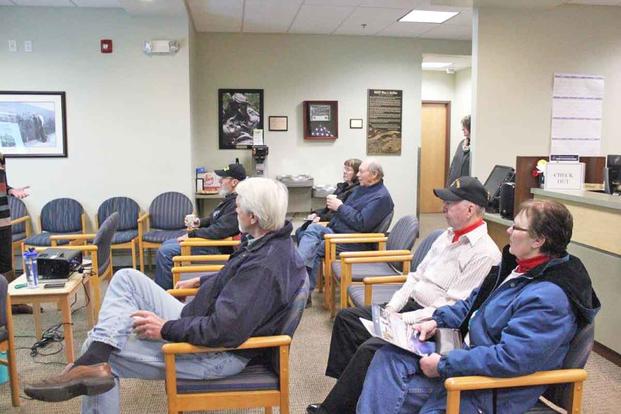Anticipating a surge in veterans seeking medical care after the pandemic ends, Department of Veterans Affairs officials said Wednesday that $17 billion marked for the VA in the Biden administration''s $1.9 trillion COVID-19 relief bill is needed so that it can continue providing all eligible veterans treatment.
Acting VA Under Secretary for Health Dr. Richard Stone said the department expects a "bow wave" of veterans seeking care that was delayed or deferred during the pandemic, and anticipates as many as 300,000 additional veterans enrolling in VA care, having lost their health insurance as a result of pandemic unemployment.
Stone said the VA is "down by 12,000 surgeries a month" -- such as knee replacements and other types of non-emergency treatment -- that were not done elsewhere, and it expects a surge in appointments in late 2021 and early 2022.
Read Next: 39-Year-Old Navy Chief Is 4th Sailor in 20 Days to Die of COVID-19
"When I was in [the Department of Defense] doing wartime funding, we viewed this as what we call contingency operation funding. I view the American Rescue Plan and the [Coronavirus Aid, Relief, and Economic Security, or CARES] Act as a contingency operation," Stone said Wednesday during a hearing before the Senate Veterans Affairs Committee.
The Biden administration's American Rescue Plan includes a $15 minimum wage, $1,400 stimulus checks for those who make less than $75,000 a year, an increase to the child tax credit, funds for the vaccine rollout, and money for reopening schools and supporting small business, as well as money for federal agencies for unexpected expenses related to the pandemic.
The House Budget Committee approved the package Monday in a 19-16 vote, largely along party lines, with one Democrat, Rep. Lloyd Doggett of Texas, joining Republicans in voting against it. The House is expected to vote on the measure later this week and, if it is approved, it will be considered by the Senate.
Under the legislation, $13.5 billion would go to VA health services, including $4 billion for private care in situations where a veteran's doctor determines that non-VA care is best for them.
The bill also includes $400 million for training programs for veterans who lost their jobs during the pandemic, and $272 million to help clear the backlog of claims applications that developed as a result of office closures.
It would allocate $750 million for state veterans homes to be used to improve care for veterans in these homes, which are not run by the VA. This money would be used for cleaning, personal protective equipment and perceived staffing shortages.
The VA has roughly $10.5 million in funding left over from the CARES Act, which was passed last March.
Committee ranking Republican Sen. Jerry Moran of Kansas asked about that funding and questioned whether the VA needs the $17 billion.
"I want to make sure that this care is not occurring in the community, under community care, it's not occurring in the VA," Moran said.
Stone said the CARES Act continues to fund COVID-19 treatment for veterans, as well as personal protective equipment, some programs for homeless veterans and community care.
As of Wednesday, the VA had logged a total of 225,797 cases of COVID since the start of the pandemic, with 10,342 total deaths. Active cases, however, are declining rapidly, down to 5,530 cases from a high of 20,650 cases on Jan. 11.
-- Patricia Kime can be reached at Patricia.Kime@Monster.com. Follow her on Twitter @patriciakime
Related: The VA Has Now Administered More COVID-19 Vaccinations Than 42 States














